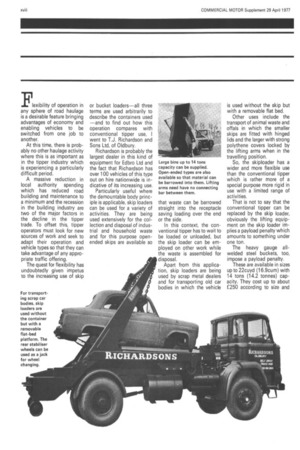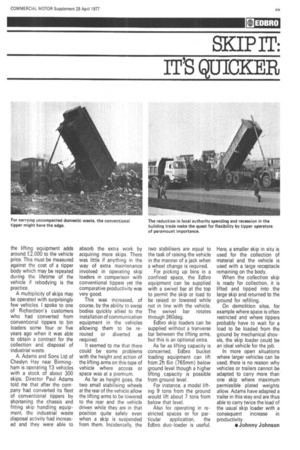F lexibility of operation in any sphere of road haulage is
Page 172

Page 173

If you've noticed an error in this article please click here to report it so we can fix it.
a desirable feature bringing advantages of economy and enabling vehicles to be switched from one job to another.
At this time, there is probably no other haulage activity where this is as important as in the tipper industry which is experiencing a particularly difficult period.
A massive reduction in local authority spending which has reduced road building and maintenance to a minimum and the recession in the building industry are two of the major factors in the decline in the tipper trade. To offset this, tipper operators must look for new sources of work and seek to adapt their operation and vehicle types so that they can take advantage of any appropriate traffic offering.
The quest for flexibility has undoubtedly given impetus to the increasing use of skip or bucket loaders—all three terms are used arbitrarily to describe the containers used —and to find out how this operation compares with conventional tipper use, I went to T.J. Richardson and Sons Ltd, of Oldbury.
Richardson is probably the largest dealer in this kind of equipment for Ecibro Ltd and the fact that Richardson has over 100 vehicles of this type out on hire nationwide is indicative of its increasing use.
Particularly useful where the demountable body principle is applicable, skip loaders can be used for a variety of activities. They are being used extensively for the collection and disposal of industrial and household waste and for this purpose openended skips are available so that waste can be barrowed straight into the receptacle saving loading over the end or the side.
In this context, the conventional tipper has to wait to be loaded or unloaded, but the skip loader can be employed on other work while the waste is assembled for disposal.
Apart from this application, skip loaders are being used by scrap metal dealers and for transporting old car bodies in which the vehicle is used without the skip but with a removable flat bed.
Other uses include the transport of animal waste and offals in which the smaller skips are fitted with hinged lids and the larger with strong polythene covers locked by the lifting arms when in the travelling position.
So, the skiploader has a wider and more flexible use than the conventional tipper which is rather more of a special purpose more rigid in use with a limited range of activities.
That is not to say that the conventional tipper can be replaced by the skip loader, obviously the lifting equipment on the skip loader implies a payload penalty which amounts to something under one ton.
The heavy gauge allwelded steel buckets, too, impose a payload penalty.
These are available in sizes up to 22cuyd (16.9cum) with 14 tons (14.2 tonnes) capacity. They cost up to about £250 according to size and the lifting equipment adds around £2,000 to the vehicle price. This must be measured against the cost of a tipper body which may be repeated during the lifetime of the vehicle if rebodying is the practice.
A multiplicity of skips may be operated with surprisingly few vehicles. I spoke to one of Richardson's customers who had converted from conventional tippers to bin loaders some four or five years ago when it was able to obtain a contract for the collection and disposal of industrial waste.
A. Adams and Sons Ltd of Cheslyn Hay near Birmingham is operating 13 vehicles with a stock of about 300 skips. Director Paul Adams told me that after the corn • pany had converted its fleet of conventional tippers by shortening the chassis and fitting skip handling equipment, the industrial waste disposal activity had increased and they were able to absorb the extra work by acquiring more skips. There was little if anything in the way of extra maintenance involved in operating skip loaders in comparison with conventional tippers yet the comparative productivity was very good.
This was increased, of course, by the ability to swop bodies quickly allied to the installation of communication equipment in the vehicles allowing them to be rerouted or diverted as required.
It seemed to me that there could be some problems with the height and action of the lifting arms on this type of vehicle where access or space was at a premium.
As far as height goes, the two small stabilising wheels at the rear of the vehicle allow the lifting arms to be lowered to the rear and the vehicle driven while they are in that position quite safely even when a skip is suspended from them. Incidentally, the two stabilisers are equal to the task of raising the vehicle in the manner of a jack when a wheel change is required.
For picking up bins in a confined space, the Edbro equipment can be supplied with a swivel bar at the top to permit the skip or load to be raised or lowered while not in line with the vehicle. The swivel bar rotates through 360deg.
Edbro skip loaders can be supplied without a tranverse bar between the lifting arms, but this is an optional extra.
As far as lifting capacity is concerned, Edbro bucket loading equipment can lift from 2ft 6in (765mm) below ground level though a higher lifting capacity is possible from ground level.
For instance, a model lifting 9 tons from the ground would lift about 7 tons from below that level.
Also for operating in restricted spaces or for par ticular application, the Edbro duo-loader is useful. Here, a smaller skip in situ is used for the collection of material and the vehicle is used with a large receptacle remaining on the body.
When the collection skip is ready for collection, it is lifted and tipped into the large skip and returned to the ground for refilling.
On demolition sites, for example where space is often restricted and where tippers probably have to wait for a load to be loaded from the ground by mechanical shovels, the skip loader could be an ideal vehicle for the job.
In more open situations where larger vehicles can be used, there is no reason why vehicles or trailers cannot be adapted to carry more than one skip where maximum permissible plated weights allow. Adams have adapted a trailer in this Way and are thus able to carry twice the load of the usual skip loader with a consequent increase in productivity.
• Johnny Johnson




















































































































































































